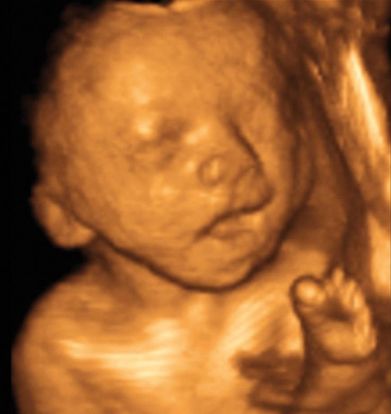24 weeks and 2 days pregnant

In the uterus, your baby’s ears not only have fluid around them but also inside. This is part of the reason that he can only hear certain lower sound frequencies. Yawning may be a way to unblock the ears, and from now on your baby spends a lot of time yawning.
If you’re feeling tired, you’re not alone. Your developing baby has been yawning for some weeks now.
All babies are known to yawn in the uterus, although the reason why they do this remains unclear. Yawning is often accompanied by shrugging of the shoulders or stretching, exactly as you would do when tired. Unborn babies have even been seen to rub their eyes!
Your baby first started yawning at around 15 weeks and has gradually yawned more and more frequently. The precise function of yawning for the baby remains in doubt and there are several hypotheses. Whilst it’s difficult to imagine that an unborn baby is actually tired, it has been found that babies who are anaemic yawn much more frequently than others. Another theory is that yawning may help the unborn baby to regulate the amount of fluid or blood flow he has within his lungs. Or yawning may simply be a primitive reflex, a remnant from an earlier evolutionary stage, with no current function.
Whatever the reason for yawning, the early stage at which this develops in the unborn baby, and the fact that all mammals are known to yawn in the uterus, does suggest that it plays an important, though unknown, role in fetal development.

Many unborn babies have been filmed yawning on 4D scans, which give a very close-up view of fetal behaviour.
Women aged over 40 are more than twice as likely to have left-handed babies.
This is according to a Canadian study and may be related to the fact that older women are more likely to experience complications in pregnancy and have more arduous deliveries. Several studies show a correlation between left-handedness and birth stress.
Your developing baby’s ears are structurally complete, and studies show that he can hear clearly now. Your breathing and heartbeat and the gurgles of your digestive system provide a constant background rhythm, but he’s also aware of other sounds.
Talking to your baby will help you to bond: research indicates that newborns recognize – and turn towards – the sound of their mother’s voice in preference to other female voices. To begin with he’ll hear deeper voices more clearly, but later he’ll register higher-pitched sounds. He will, of course, become more familiar with his mother’s voice, partly because this is what he will hear most often and also because her body is a good conductor of sound and vibration.
You may have noticed that sudden noises make your baby startle. In one study, ultrasound scans of fetuses showed that they had a “blink-startle” response to loud noises from around 24 weeks.
Be the first to support
Be the first to share
Comment (0)
Related Blogs & Vlogs
No related events found.
Loading more...